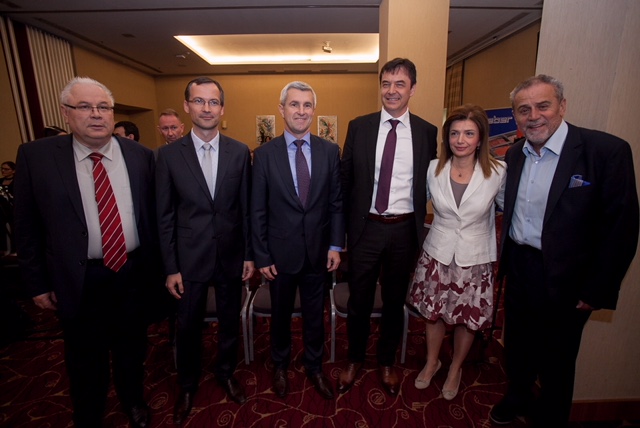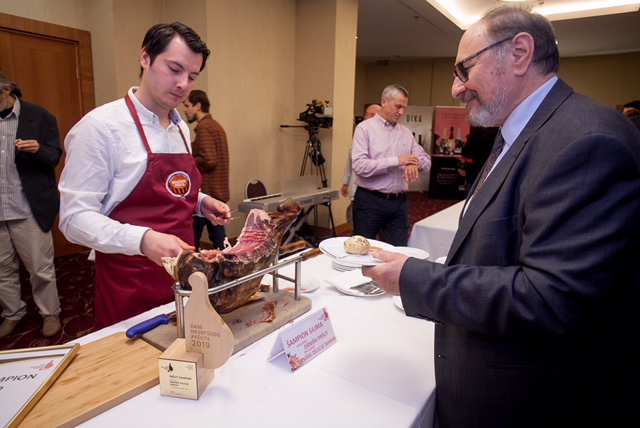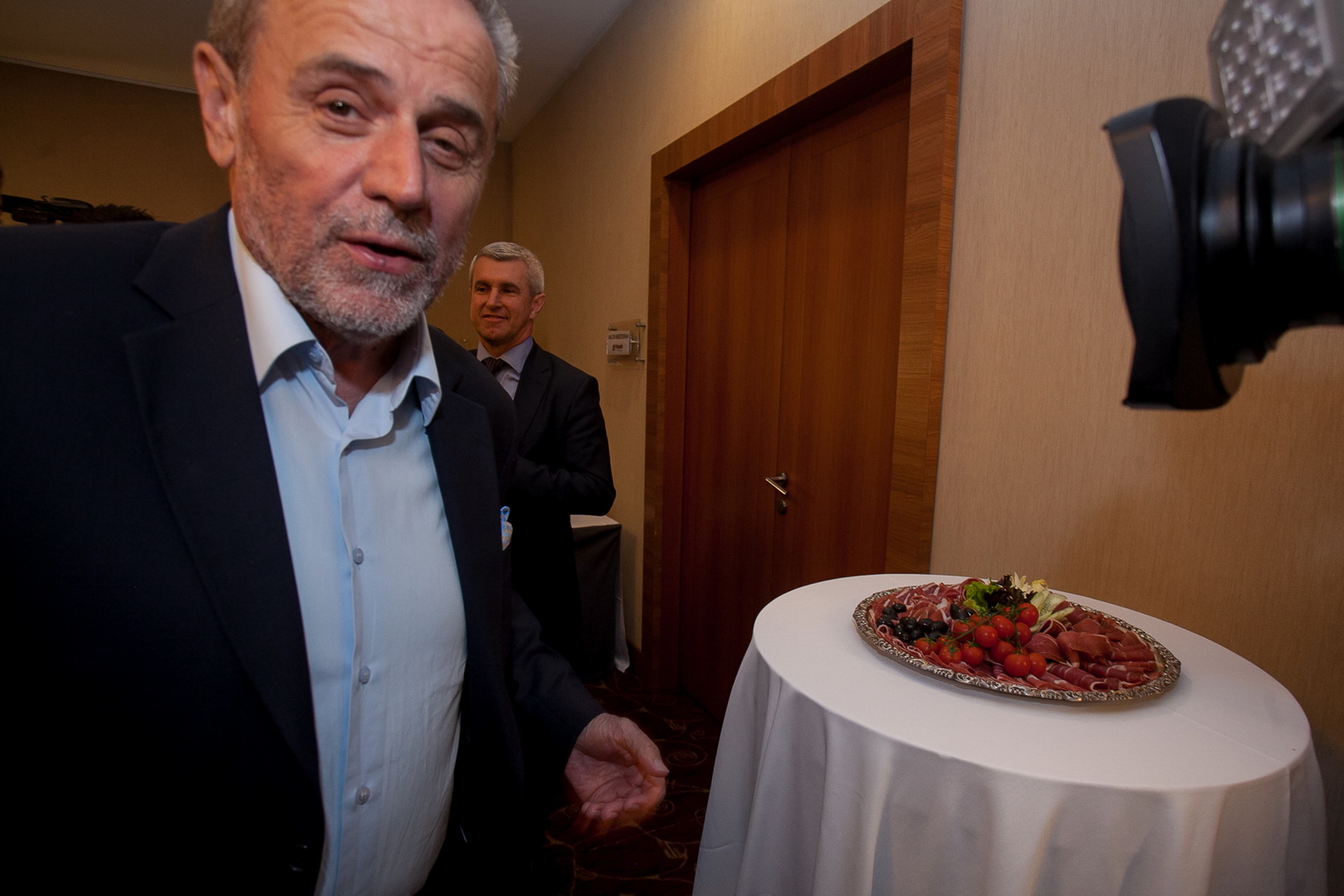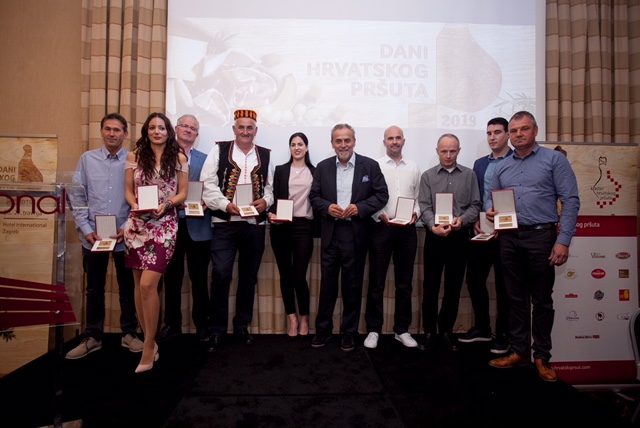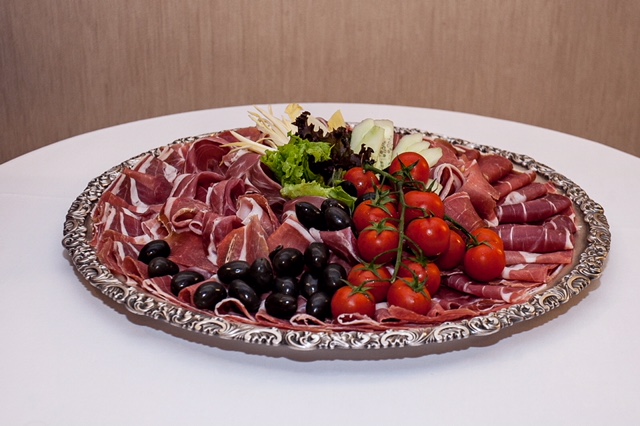Croatian and Chinese Officials Developing Agricultural Cooperation
ZAGREB, June 17, 2019 - A delegation of the Chinese Ministry of Agriculture and Rural Affairs led by Minister Han Changfu arrived in Zagreb on Monday for a three-day official visit to Croatia.
During their stay in Croatia, the Chinese officials will be received by Agriculture Minister Tomislav Tolušić and visit several agricultural and food producers, the ministry said in a press release.
The talks with Tolušić are scheduled for Monday afternoon.
A joint press conference will be held after a meeting in the government on Tuesday.
The delegation will visit the Koka poultry processing plant in Varaždin and after that it will travel to the southern coastal town of Ston to tour the local saltworks and oyster farms.
Minister Tolušić conducted a visit to China last week where he attended the 4th dialogue between China and Central and Eastern European countries regarding customs, inspections and quarantine.
Tolušić 's visit to China was aimed at speeding up the process of approving the import of Croatian agricultural products - particularly meat and meat products, fresh tuna and honey to China, and that was the topic of a bilateral meeting between Minister Tolušić and Vice Minister Wang Lingjun in the General Administration of Customs (GACC).
The two officials then agreed on further exchanging information with the aim of expediting procedures and strengthening foreign-trade exchange of agricultural products between Croatia and China.
During an official visit of China's Premier Li Keqiang to Croatia in April, a protocol was signed paving the way for the export of Croatian dairy products to the Chinese market following the inspection of Croatia's processing plants and food control system by Chinese experts.
More news about relations between Croatia and China can be found in the Politics section.
Fish Farming Not Developed Enough in Croatia
ZAGREB, June 10, 2019 - Croatia has great potential in freshwater fish farming, but it does not make sufficient use of it, as evidenced by low fish consumption, it was heard during a recent parliamentary discussion on the final bill on freshwater fish farming.
Out of eight kilos of fish consumed per capita in Croatia annually, a mere one kilo is freshwater fish, Alen Prelec of the Social Democratic Party (SDP) said during the parliamentary debate.
For the sake of comparison, 55 kilos of fish is consumed annually per capita in Portugal, he added.
He also noted that data on domesticated carp for the 2015-2016 period showed that the area of freshwater farms had increased. However, there were fewer and fewer domesticated fish. He wondered whether this might be evidence of the purchase of carp on the grey market.
Anđelko Stričak of the Croatian Democratic Union (HDZ) said that until 1991 Croatia produced 15,000 tonnes of farmed fish annually, whereas currently the annual production of farmed freshwater fish is 4,000 tonnes.
He said that there are a number of reasons for this situation, including complications in registration of ownership, freshwater farms and agricultural land, revenue declines, and higher prices of raw material.
More news about agriculture and fishing can be found in the Business section.
Days of Croatian Prosciutto Held in Zagreb
On 26th and 27th of April, Zagreb, the capital of Croatia, is also the capital of prosciutto. Prosciuttos from all over Croatia – from Istria to the island of Krk; from the famous Drniš prosciutto to the various Dalmatian prosciuttos – have gathered peacefully and cheerfully as a part of the fifth edition of the Days of Croatian Prosciutto, which are being held in the capital for the first time.
The event was officially opened yesterday morning at the Hotel International. The opening ceremony was attended by Darko Markotić, president of the Croatian Prosciutto cluster; State Secretary at the Ministry of Agriculture Tugomir Majdak; Dragan Kovačević, Vice President for Agriculture and Tourism of the Croatian Chamber of Commerce; and Zagreb Mayor Milan Bandić. The ceremony also included the presentation of special plaques for the excellence in prosciutto making and the selection of the best Croatian prosciutto for this year.
Ten samples were received for tasting, including all certificated Croatian prosciuttos. That the products offered were of exceptional quality is proven by the fact that all samples won gold medals, and the range of points was from high 87.75 to extra-high 95.38. The Drniš prosciutto Drniških Delicija Maran, with 95.38 points, was the absolute winner.
"I am pleasantly surprised with the title, because the competition was strong, although the number of producers is still too low for us to achieve a breakthrough in Europe," said this year's winner Zoran Ćevid, who produces his prosciuttos according to traditional recipes. For high-quality smoked ham, the most important is raw material. It is also necessary that no more than 72 hours pass from slaughter to salting.
"Statistics show that we produced about 250,000 prosciuttos five years ago, but now the number has reached 400,000. That is a large growth of sixty per cent. This is the result of hard work and large investments, perhaps the largest in the food industry sector, amounting to more than 40 million euro. The biggest success is that the share of domestic raw material in our prosciutto production has grown over the past five years from 10 per cent to more than 50 per cent,” said Darko Markotić, president of the Croatian Prosciutto cluster.
"We will provide national financial support to increase primary production and thus get quality raw material for the production of Croatian prosciuttos," said State Secretary at the Ministry of Agriculture Tugomir Majdak, adding that pig breeding is a strategic branch that the government plans to develop.
“In addition to the export potential, the Croatian prosciutto has a great potential in tourism through the top gastronomic offer, because modern tourists are looking for an authentic experience, and it is through gastronomy that they can best learn about the way of life, customs and rich traditions of a particular destination,” said Dragan Kovačević.
Mayor of Zagreb Milan Bandić presented the gold medals, adding that he also produces prosciuttos which the attendees could taste. Special prizes were awarded for the development of prosciutto production to producers Josip Hreljak, owner of Pisinium, the company famous for the production of top Istrian prosciuttos, and Jure Barić, owner of the Opskrba Trade company from Slivno near Imotski, known for the production of Dalmatian prosciutto.
More Croatian food news can be found in the Lifestyle section.
Sale of Croatian Beef Up 25%
ZAGREB, April 22, 2019 - The Baby Beef association has recently reported that the sale of Croatian beef in retail chains and butcher shops has increased at a double-digit rate and that this year beef cattle farming will increase between 10% and 15%.
The association sees this as a turning point in the beef production in Croatia.
For the first time in ten years the growth in rate of the volume of imported beef has been stopped and last year it grew by 2% while imported fresh beef increased by 1% which could almost be described as stagnation. At the same time the sale of beef branded by the Baby Beef association increased by 25% in certain retail chains, the president of the association, Darko Celovec said.
He added that more than 50 new members have joined the association this year and production is increasing.
According to the association, Croatian beef has entered into seven large retail chains and the number of butcher shops ordering baby beef has increased too. To date 29 partner agreements have been signed for the use of the Baby Beef brand, the association said in a press release.
"Our results have proved that Croatian consumers seek domestic products," Celovec said.
The association believes that business with Croatian beef could grow between 10% and 20% this year.
Celovec added that this refers to exports too, underlining that Croatian beef is exceptionally valued on foreign markets and that about 50% of beef owned by the association's members is exported.
Three new markets have opened up - Kosovo, Serbia and Montenegro and intensive negotiations are underway to enter the Turkish market, the press release said.
The Baby Beef association bring together about 330 cattle farmers with 120,000 cattle a year and generate more than one billion kuna in revenue. About 50% of that is exported either as live animals to the Middle East or sold as fresh meat to Italy.
More news about Croatian agriculture can be found in the Business section.
Use of Farmland Becoming Economic and Political Problem
ZAGREB, April 12, 2019 - The use of state-owned farmland is becoming not only an economic but also a political problem that will be difficult to solve without a clear position of the Agriculture Ministry, and the failure to solve it will continue to contribute to the depopulation of rural areas, it was said at a round table discussion on the use of state-owned farmland, held in the eastern city of Osijek on Friday.
Vladimir Margeta of the association of family farms "Život", which organised the event, said that more than a year had passed since the adoption of the State-Owned Farmland Management Act but that less than one-third of development programmes which towns and municipalities submitted to the Agriculture Ministry had been approved, which was why no tenders for grants were being advertised.
Speaking of the renewal of concession agreements with mirror companies from the former Agrokor conglomerate, Margeta said that farmland was the main resource of agricultural production and that it should be privatised as well as that a review of how farmland had been allocated so far should be conducted.
He said that he believed that "this is actually a political decision just as it was when concessions were awarded the first time" and that his association believed that that decision should not be shifted to local government units.
"Some mayors have still not signed extensions of farmland lease contracts and tell us that they are being pressured into doing so as soon as possible. That situation is not good and will result in processes which we have been witnessing in recent years, such as depopulation and low birth rates," said Margeta, noting that people who wished to engage in agriculture could not obtain a contract on the lease of farmland for cultivation or obtained it at a price that was several times higher than the price paid by companies from the former Agrokor conglomerate.
Snježana Kraml, a representative of the Agriculture Ministry, said that the ministry had so far received 381 development programmes, of which 168 had been consented to, and that local government units could start preparing for tenders.
"Programmes that have been prepared well have been forwarded to counties for adoption and those with shortcomings have been returned to local government units for correction, with instructions on how to do it," she said.
Tomislav Panenić, chair of the parliamentary Agriculture Committee, said that under the Farmland Act mayors and municipality heads "can practically decide on their own whether or not they want to sign certain contracts or annexes to contracts", while on the other hand, there was the Emergency Administration in Strategically Important Companies Act, which refers to the former Agrokor group, and under which that could be done by force of law.
Panenić said that the prosecutorial authorities maintained that under the Emergency Administration in Strategically Important Companies Act the signing of lease agreements with companies from the former Agrokor group could be achieved by force of law, and he wondered why that had not been done and why local authorities were being forced to make decisions that were contrary to the interests of their communities.
There is no clear position on the part of the Agriculture Ministry on how the annex signing procedure will unfold and the deadline is very near because May 15 is the deadline for registration for direct payments, Panenić said.
He said that he feared mayors would shift decision-making onto municipal and town councils, which also include local farm producers and which could have problem making decisions to the benefit of successor companies to the Agrokor conglomerate.
"I believe that local officials expect the government to assume that responsibility rather than forcing them to make problematic decisions," said Panenić.
More agriculture news can be found in the Business section.
European Commission Approves Grants for Fruit, Veg and Milk in Schools
ZAGREB, March 28, 2019 - An amount of 250 million euro was approved by the European Commission on Wednesday for the free distribution of fruit, vegetables and milk for 20 million children throughout the EU in the 2019/2020 school year.
The national budget allocations were adopted today. 145 million euro was set aside for fruit and vegetables, and €105 million for milk and other dairy products. The distribution programme is complemented by educational measures that teach children about agriculture and promotes healthy eating, the European Commission said in a press release.
Croatia will receive 1.66 million euro for fruit and vegetables and an additional 800,354 euro for milk.
According to the law that has been applicable since 1 August 2017, 2 previous schemes were combined under a single legal framework which is focused on an enhanced educational dimension.
Countries participating in the programme are expected to prepare strategy outlines for a period of 6 years, noting objectives and priorities, target groups (primary schools, for example), products (apples and carrots for example) and education activities (farm visits, school gardens, training).
"Thanks to the EU School Scheme, our young citizens can benefit from the nutritious, safe and high-quality food that our European farmers produce, while also learning about where it comes from. The Commission is proud to contribute to this important educational journey, establishing healthy habits from a young age," Agriculture and Rural Development Commissioner Phil Hogan said.
More news about EU funds can be found in the Business section.
Problems Continue at Županja Combine Harvester Factory
ZAGREB, March 6, 2019 - The management of the Same Deutz Fahr Žetelice company, the Croatian Metal Workers' Union and the striking committee of the company's combine harvester factory in the eastern Croatian town of Županja agreed to a wage increase at their meeting in Treviglio, Italy earlier this month, but the striking committee is not particularly satisfied, the committee's chairman Marko Ivkošić said on Tuesday.
It was agreed that the monthly wage would be increased by 487.50 kuna gross for this year, by an additional 112.50 kuna for 2020 and a further 150 kuna for 2021, on the condition that the trade union did not negotiate further changes to the collective agreement or wage hikes by March 1, 2022.
"We are not particularly pleased with the outcome, so I will have to ask for workers' opinions. I'm afraid that skilled workers will continue leaving because the pay is still low," Ivkošić told the press, adding that eight workers had left the factory during a recent strike.
He recalled that the average monthly wage at the factory was about 3,500 kuna net, adding that 85 young workers had left in the last two years aware that they could earn more than 2,000 kuna for similar jobs in western Europe.
The strike at the factory started on January 9 over low wages. The factory owners tried to contest the legality of the industrial action in court but the Vukovar County Court has found the strike to be legal. The owners then appealed to the Supreme Court, which upheld the appeal and banned the strike. The workers returned to their jobs and resumed production on February 8.
The workers had demanded an increase in gross wage of 740 kuna plus an 8% allowance for special working conditions in production, which the owners rejected. A failed conciliation process was then followed by a strike.
More news about agriculture in Croatia can be found in the Business section.
National Agricultural Strategy Expected in June
ZAGREB, March 5, 2019 - Agriculture Minister Tomislav Tolušić said on Tuesday that he expected a national agricultural strategy to be adopted in June.
Speaking at a national agricultural conference in the eastern city of Osijek, Tolušić said that the strategy was being drawn up by the World Bank with the participation of Croatian, French, Dutch, American and Greek experts working at the World Bank.
"I expect the strategy to be adopted in June this year, which I think is very soon given that we haven't had one so far," the minister said.
Tolušić said that a tender would be issued this summer for the purchase of about 20 cold storage facilities. "Cold storage facilities will be installed across the country to deal with the problems of our fruit and vegetable growers. The government will build complete public infrastructure with money from the Rural Development Programme. We have agreed this with the European Commission," he said.
Tolušić announced that as of October this year, second- to fifth-year students studying agronomy at any of the colleges in the Slavonia region would be offered an annual scholarship of 10,000 kuna (1,350 euro).
"I think we need to strengthen the agronomic profession in Slavonia, and will be pleased if many of the agronomy students decide to stay to live and work in Slavonia," the minister said.
The conference was attended by some 350 participants, representatives of large, medium and small businesses, family farms, agricultural institutions and the academic community.
More agriculture news can be found in the Business section.
Croatian Beekeepers Granted Financial Aid
ZAGREB, February 26, 2019 - Croatian beekeepers will have 3.2 million euro annually at their disposal as part of financial assistance in the period from 2020 to 2022, according to a draft assistance scheme prepared by the agriculture ministry. The document has been put up for public consultation until 6 March.
The proposed funding for aid to apiarists and honey producers has been calculated based on their needs in the previous period and the final decision will depend on the relevant regulations which the European Commission is supposed to adopt.
The assistance scheme includes eight measures, and one of them is treatment of varroosis, the condition of a honeybee colony being infested with Varroa mites, and other diseases.
During the last three years, the number of beekeepers and hives dropped considerably.
For instance, the number of apiarists fell by 41.86% to 7,283 in 2018 compared to the state of affairs in 2015, and the number of hives was cut by 34.13% to 372,0002.
The data collected by the Croatian Bee Keepers Alliance (HPS) and other relevant authorities show that a marked number of beekeepers have a small number of colonies.
Thus, 3,024 apiarists in Croatia (41.5% of registered beekeepers) have up to 30 colonies. They can be treated as amateur apiarists.
Furthermore, every other beekeeper, that is about 4,000 of them, possesses between 31 and 150 colonies, and they have 255,251 hives, which accounts for 68.6% of the total number of hives.
There were 267 professional beekeepers (3.7%) who owned more than 150 colonies, and 64,663 hives (17.4% of the total number of hives) in 2018.
An estimated 7,440 tonnes of honey were produced in Croatia last year, as against 8,138 tonnes produced in 2017.
More news about agriculture in Croatia, especially the beekeeping sector, can be found in the Business section.
Croatian Consumers Sold Food Infected with Bacteria and Mould
The Croatian Food Agency has released a report by the Food Safety Centre on the results of self-control measures implemented by food producers during the last three years. A total of 15,281 food samples were analysed. More than 5,000 samples are processed every year. The results show that Croatian consumers are occasionally sold food infected with bacteria and mould, reports Poslovni.hr on February 1, 2019.
The food samples were analysed against the microbiological parameters in accordance with the Microbiological Food Criteria Decree and Guide, and the results have been processed together and summarised, according to the Croatian Agricultural and Food Agency's report. It should be noted that the report by the Food Safety Centre does not state during which three years the inspections were carried out.
The results of the report indicate the presence of an increased number of aerobic mesophilic bacteria in most food categories. They are followed by enterobacteria, then moulds and yeasts, and in a small number of food categories, the contamination with bacteria was also established.
It should be noted that the increased number of aerobic mesophilic bacteria in food usually indicates old food and food with poorer microbiological quality.
Food safety is an imperative in placing the products on the market, which is why in the food industry, at the industrial and crafts level, the production is regulated by a number of regulations (laws, decisions, regulations, guides) whose criteria the food must meet at the time of manufacture and when being placed on the market, until the end of its stated shelf life.
EU rules on food hygiene throughout the food chain are the same in all member states. Food business entities bear the primary responsibility for food safety. This means that, according to the legal provisions, the entities are obliged to establish a self-control system for their production so that the food they produce satisfies the food safety criteria.
Translated from Poslovni.hr.
More news on the Croatian agriculture and food sector can be found in the Business section.

